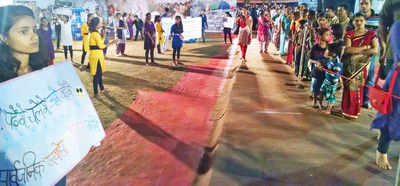Making a pitch for feminism through Ganpati mandals

Women’s group Vacha makes an effort to take its quest for ‘azaadi’ to a wider audience
Mumbai: The long wait for darshan of the Andhericha RajaGanpati on Saturday night turned interesting for devotees as a group of teenaged girls took to the mike and started talking about how difficult it was for them to access public spaces. This was a “sarvajanik” mandal, they pointed out, open to all. But could girls access it on their own? Could girls access public toilets without fear? Or maidans where boys played freely? Public reading rooms were dominated by older men. Even public roads were unsafe for girls, they pointed out. If these girls didn’t have the ‘azaadi’ to go to these “sarvajanik” places, could the rest of the country call itself really azaad, they asked.
These girls are members of Vacha, a women’s group that works with adolescent girls and boys in suburban slums. This performance was part of a campaign being run by Vacha along with six other groups for the right to safe public spaces for girls.
Amrita De , adding that the girls themselves approached the mandals for permission.
“Ganpati mandals enable us to reach out to so many people,” saidSabah Siddiqui , one of the performers. A college student who’s been with Vacha for nine years, Sabah said that in her Andheri slum, the Vacha unit had started playing in the maidan nearby, and the boys who monopolised it earlier were now showing a grudging acceptance. Also, their campaign had resulted in fewer bikes being parked at the entrance of the women’s toilets in the slum. Boys would sit around on these bikes, making it difficult for girls to enter the toilets.
Sabah Siddiqui was not the only Muslim in the group. Sabah Ansari’s father is a maulana; but he had allowed her to participate in this performance at a Ganpati mandal. “Our parents support us because they have seen our growth in studies as well as in confidence after we joined Vacha,” said the Std IX student. “Many burqa-clad girls come here; they too make offerings of coconuts,” revealedAshok Rane , secretary of the Azad Nagar Sarvajanik Utsav Samiti.
When he gave permission for the performance, Rane didn’t know Vacha. After seeing the first performance on a stage which was at a distance from the devotees, he was so pleased with it that he suggested a second one closer to the queue. This was the campaign’s first performance at a Ganpati mandal; altogether 35 are planned till the festival ends.
Mumbai: The long wait for darshan of the Andhericha Raja
These girls are members of Vacha, a women’s group that works with adolescent girls and boys in suburban slums. This performance was part of a campaign being run by Vacha along with six other groups for the right to safe public spaces for girls.
By the end of the performance, the devotees in the queue were shouting slogans too, at the request of the performers: “Yeh maidan jitna tumhara, utna hamara”; “Protection nahin, safety chahiye”. They obliged when requested to show their support by holding placards made by the performers. A few even stayed on to watch after finishing their darshan. “We chose Ganpati mandals because they are in public spaces, and are dominated by men,” said
“Ganpati mandals enable us to reach out to so many people,” said
Sabah Siddiqui was not the only Muslim in the group. Sabah Ansari’s father is a maulana; but he had allowed her to participate in this performance at a Ganpati mandal. “Our parents support us because they have seen our growth in studies as well as in confidence after we joined Vacha,” said the Std IX student. “Many burqa-clad girls come here; they too make offerings of coconuts,” revealed
When he gave permission for the performance, Rane didn’t know Vacha. After seeing the first performance on a stage which was at a distance from the devotees, he was so pleased with it that he suggested a second one closer to the queue. This was the campaign’s first performance at a Ganpati mandal; altogether 35 are planned till the festival ends.
GALLERIES View more photos









